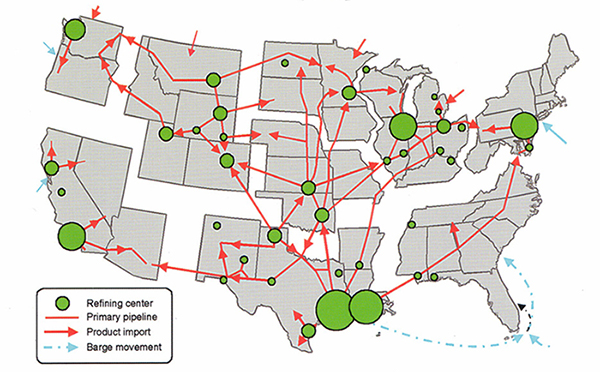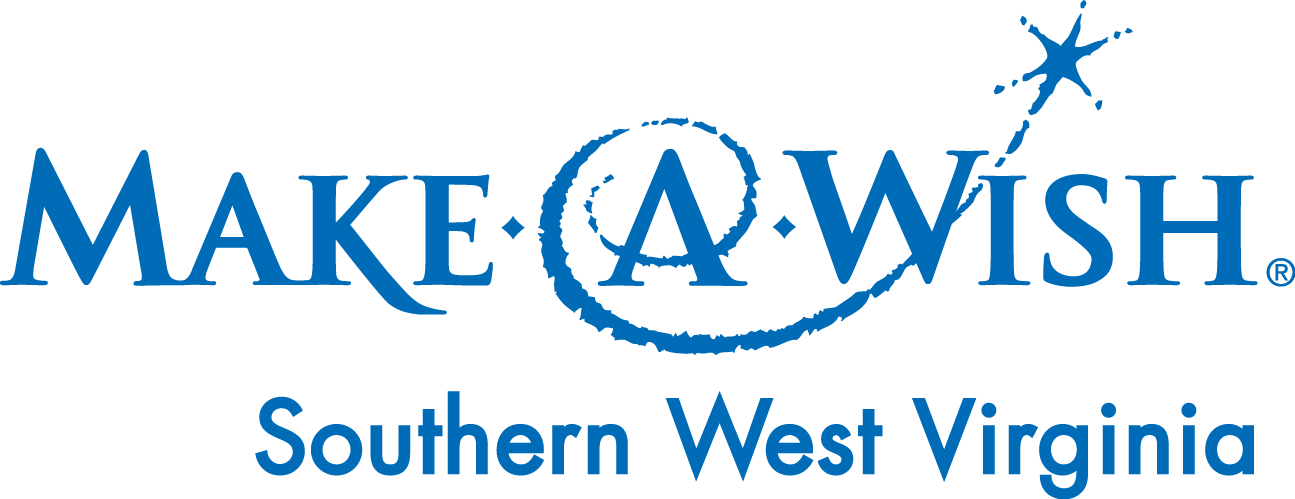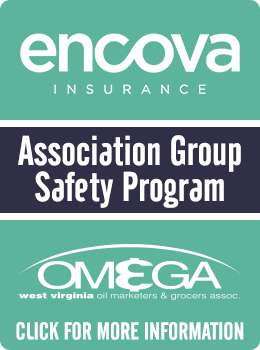
Graphic: Courtesy of National Association of Convenience Stores Source: Energy Analysts International, Inc.
The complex gasoline supply structure in the U.S. varies greatly by region, with some areas more sensitive to supply imbalances.
Two regions have more supply than required to meet demand and are therefore able to transport excess supply to other markets. These regions are generally less likely to face extreme price spikes when the distribution system is disrupted.
- Mid-continent: Has sufficient refining capacity to meet demand in the region, but is "long" on supply due to large volumes of gasoline moving via pipeline from the Gulf Coast through the region to the Midwest.
- Gulf Coast: Has major refining centers that supply large volumes to other regions, including the Mid-continent, Midwest, and Eastern Seaboard markets. Gulf Coast refiners and several foreign refining centers are the sources of supply for other U.S. regions.
Four regions have significant refining bases that allow them to provide refined fuel to meet much of their fuel needs. However, since demand in the region is greater than supply, they must rely on additional supplies. Disruptions to their refining operations can have a significant impact on the price of gasoline in these regions, especially those with high demand for fuel.
- Midwest: Some additional fuel is brought in by barge up the Mississippi River, with the majority brought in by pipeline from the Gulf Coast.
- Pacific Southwest: Additional fuel is brought in by pipeline from West Texas to Phoenix, and via tankers from the Gulf Coast, Caribbean, and other foreign sources.
- Northeast: Additional fuel is brought in via pipeline from the Gulf Coast, and from sources in Eastern Canada and overseas.
- Pacific Northwest: Additional fuel is brought in via pipeline from the Rockies and tankers from California.
Two regions have limited refining capacities and rely on fuel to be brought in from other regions. These regions can face price variations when supply from other regions or countries is disrupted.
- Rocky Mountain: Has a refining base of small refineries and relies on additional fuel brought in by pipeline from the Mid-continent and Texas Panhandle.
- Southeast: Has a very small refining capacity and most states, except Florida, are supplied by pipeline from the Gulf Coast. Florida is supplied by barge from the Gulf Coast, with significant foreign supply imported into the Atlantic Coast ports.
OMEGA is comprised of hometown employers and entrepreneurs contributing to our communities. We believe that advantages should not be given to large out-of-state companies or that our surrounding states should have advantages over us. We continue to seek an even playing field to conduct business.
Differences in excise tax rates across jurisdictions create incentives for consumers to cross the border and purchase in lower-tax jurisdictions. There are certain commodities that consumers shop price for and among those are gasoline, cigarettes and beer. It is estimated that 50 percent of West Virginia residents live near a border, therefore being competitive on those borders is important to West Virginia retailers. We know that when consumers go across the border for these items that they make other purchases. So, not only does West Virginia lose the tax on these items they lose the sales tax on other items as well.
50% of West Virginia residents live near a border, therefore being competitive on those borders is important to West Virginia businesses.

Food, fuel and convenience, providing life’s essentials to West Virginia. That’s our tagline and describes simply and effectively what our members do.
West Virginia Oil Marketers & Grocers Association (OMEGA) members are all local, community-based businesses. We are the convenience stores, independent groceries and petroleum marketers providing the daily necessities to maintain our quality of life. From gas and coffee to produce, meat and foodstuffs, to oils and lubricants for heavy industry, we keep West Virginia running. And, we’re open when you need us, offering service at your convenience.
OMEGA members understand the vital role they play. If our stores aren’t open, our customers and the communities in which we are located suffer. Imagine the hassle of pulling into your local convenience store for gas or stopping by your favorite grocery store to pick up ingredients for the evening dinner and finding them closed. Similarly, if our petroleum industry businesses are unable to provide the lubricants for their manufacturing and coal clients, business would grind to a halt.
Our member businesses are intrinsically linked to our citizenry’s quality of life and we take that seriously.


Because OMEGA members are so closely tied to the communities in which they are located, we believe it is our responsibility to help out and give back where we can. You have likely seen our member's corporate names emblazoned on the backs of little league and other athletic team jerseys. We support local charities, churches and nonprofit organizations through in-kind and financial donations. And, through our trade association, OMEGA has been a force for the betterment of children and their families throughout the state.
In 2003, OMEGA members gathered with the goal of identifying how they could pull together to help out in a larger way and on a broader scale. Recognizing the great need for improving health and wellness among West Virginia’s youth population, they set a course which has resulted in more than $2.9 million being raised over the last 10 years. The beneficiaries of these funds have included children all across West Virginia for the purpose of medical procedures, after school programs and “wishes” for the critically diagnosed.
Additionally, OMEGA’s scholarship program, which provides $1,000 scholarships to member employees and family members, has awarded more than $132,000 since the program’s inception in 1996.
Our member industries are constantly evolving to meet the needs of today’s customer. It used to be that convenience stores sold, primarily, gas and ice. That certainly has changed to the point that gas has become a commodity item and the products sold in the store have become the main draw. It is now common to find restaurant chains inside our stores as well as a more robust offering of products people want. Our local groceries have changed to provide the specialty products shopper’s desire, which may not be available at the big box stores.
Charitable Contributions Through the Years
| Year | Organization | Amount Raised |
| 2003 | Children’s Miracle Network | $43,000 |
| 2004 | Children’s Miracle Network | $71,335 |
| 2005 | Children’s Miracle Network | $156,182 |
| 2006 | Children’s Miracle Network | $175,249 |
| 2007 | YMCA | $77,413 |
| 2008 | Make-A-Wish | $156,131 |
| 2009 | Make-A-Wish | $191,650 |
| 2010 | Make-A-Wish | $201,849 |
| 2011 | Children's Home Society | $61,384 |
| 2012 | Make-A-Wish | $203,074 |
| 2012 | Children's Home Society | $91,143 |
| 2012 | Make-A-Wish | $164,271 |
| 2013 | Children's Home Society | $93,515 |
| 2013 | Make-A-Wish | $161,466 |
| 2014 | Children's Home Society | $121,512 |
| 2014 | Make-A-Wish | $126,050 |
| 2015 | Children's Home Society | $79,615 |
| 2015 | Children's Home Society | $64,135 |
| 2016 | Children's Home Society | $130,391 |
| 2017 | Children's Home Society | $113,600 |
| 2018 | Children's Home Society | $116,328 |
| 2019 | Children's Home Society | $124,261.37 |
| 2020 | Children's Home Society | $100,026 |
| 2021 | Children's Home Society | $174,034 |
| Total Raised: | $2,998,228.37 |
For questions. media inquiries or additional information, please contact:
West Virginia Oil Marketers and Grocers Association
2006 Kanawha Blvd. East
Charleston, West Virginia 25311
omega@omegawv.com
Phone: 304.343.5500
Fax: 304.343.5810
Traci Nelson
President
traci@omegawv.com
304.343.5500
Daniel Hall
Director of Government Affairs and Membership Development Coordinator
daniel@omegawv.com
Missy Morgan
Member Services Coordinator
missy@omegawv.com
Members Benefits
Types of Membership
Convenience Store Member - Neighborhood businesses offering gasoline, food and other services at convenient locations all around West Virginia.
Petroleum Marketer Member - Local businesses that fuel public and commercial transportation through the marketing, blending and transport of various grades of fuels and lubricants to industrial customers, gasoline stations and convenience stores.
Grocer Member - Community grocery stores providing life’s essentials – foods, household goods and much more
State & National Liaison
We act as a liaison with many state agencies including the Department of Environmental Protection (DEP), Department of Labor (DOL), Public Service Commission (PSC), Department of Transportation (DOT), State Tax Department and many others. We work closely with National Association of Convenience Stores (NACS), Petroleum Marketers Association of America (PMAA), Food Marketing Institute (FMI) and the National Grocers Association (N.G.A.) on Federal legislation and government affairs.
Lobbying
We maintain strong one-on-one contact with state legislators and government leaders. We are proactive in our efforts for the benefit of our industry and members.
We represent the industries on such issues as:
- Credit card fees
- Fuel tax stability
- Tax reform
- Fair competition and border stability
- Civil justice reform
- Health Care
- Bottle bills
- Governmental regulatory authority and cooperation
Communication & Education
We constantly strive to keep members informed regarding issues affecting their businesses. For example:
- We supply a monthly newsletter, At the Pump and Down the Aisle, and various timely bulletins throughout the year on specific issues.
- When the Legislature is in session, members receive News From Inside the Capitol legislative updates to keep them abreast of legislative activity and to aid in our grassroots efforts.
- Our website, which supplies a vast array of information to keep members informed, as well as links to other industry sites.
- OMEGA members have access to our UST Class C Operator Training free-of-charge via our web site.
- A membership directory is published bi-annually. This directory serves as a great reference guide for members.
- OMEGA sponsors informational seminars to help keep members up to date on regulations, trends and industry changes. We host Workers’ Compensation, DEP/Weights & Measures, UST Re-certification and other specialized seminars.
Survival Hotline
Members are urged to call the OMEGA office at (304)343-5500 anytime with questions concerning new laws and regulations or any matters that affect their business.
 Encova Workers’ Compensation Discount Program
Encova Workers’ Compensation Discount Program
OMEGA has teamed with Encova Insurance to offer active OMEGA members who have a good safety record a discount on their workers’ compensation premiums.
Our current discount with Encova is 2.3%.
- If you can meet just a few criteria, your company can qualify for this cost savings program through OMEGA. The criteria includes:
- Report claims within 48 hours of a loss;
- Achieve and maintain a loss ratio of 65% or less;
- Implement a formal Return to Work Program;
- Attend at least one safety seminar per year that applies to operational hazards or complete one on-line course through Safety Source;
- Implement Encova 5 Step Loss Control program; and
- Be a member of OMEGA.
That is all there is to the program. You continue to make your payments to Encova and continue to use the agent
Trade Expo
Annually we host a Trade Expo and Golf Outing. This show offers approximately 100 booths of the newest products and services for our industries.
Children’s Charities
Annually, OMEGA spearheads our members in fundraising efforts to benefit charities, which better the lives of West Virginia children. In the past, we have raised money for Children’s Miracle Network, YMCA After School Programs, the Make-A-Wish Foundation and WV Children’s Home Society of WV. To date, we have raised over $2.1 million for these worthwhile charities.
Membership Directory
A Membership Directory is published annually. This directory serves as a great reference guide for members.







